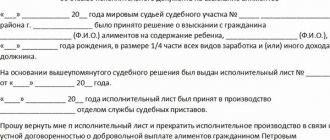When enforcement proceedings on alimony are suspended
There are a number of legal reasons used to stop enforcement proceedings (IP) on alimony payments. The list is presented in paragraphs 39-40 of Law No. 229-FZ (on enforcement proceedings) and Article 120 of the Family Code.
The reasons for which an individual entrepreneur is automatically terminated include:
- death of the alimony payer or recognition of him as missing;
- incapacity of the debtor, approved by the court;
- participation of the alimony worker in hostilities or armed conflicts as part of the relevant formations;
- the child for whom child support is being paid reaches 18 years of age;
- adoption of a minor for whose maintenance payments were transferred;
- the payer is a foreign national, and he has no assets that can be foreclosed on.
The following circumstances are used as additional grounds for temporary suspension of production:
- the payer's conscription service;
- the alimony worker's stay for treatment;
- consideration of an application to invalidate the alimony claim;
- challenging a court decision on the basis of which financial support was awarded;
- search for the payer;
- departure of the debtor, for example, on a business trip;
- the difficult financial situation of the alimony recipient (lack of a permanent source of income for a good reason and the inability to cover the debt from personal property).
Both the court and the bailiff service (FSSP) can resolve the issue of suspending proceedings. It all depends on the essence of the situation and the grounds for closing the alimony case.
For example, enforcement proceedings may be terminated at the request of the recipient of alimony. A similar situation is possible when, for example, a man promises the mother of his child to transfer funds voluntarily, while persuading him to stop the enforcement proceedings. The woman, trusting the words of her ex-husband, sends a corresponding application to the FSSP. The bailiffs, in turn, issue a resolution to temporarily suspend the proceedings, of which both parties are notified.
It is important to clarify that the main legal consequence of the procedure for freezing an individual entrepreneur is the impossibility of forcibly collecting from the alimony payer amounts for the maintenance of a child or other person in need. However, this does not mean that a citizen cannot transfer funds on a voluntary basis.
Enforcement proceedings on alimony: general provisions
How to resume enforcement proceedings for alimony
When collecting alimony as part of enforcement proceedings, the plaintiff and defendant act in accordance with the procedure provided for by Federal Law No. 229 “On Enforcement Proceedings” and the provisions of the RF IC.
Based on federal law, the basis for withholding alimony is a writ of execution issued by bailiffs and sent to the defendant’s employer.
Having received a writ of execution from the FSSP, the employer immediately accepts it for execution, namely, makes penalties in the amount and in accordance with the procedure provided for by the writ of execution.
The employer stops collecting alimony when one of the following events occurs:
- Lack of grounds for recovery. If a writ of execution orders to withhold alimony from the defendant’s salary until the child turns 18, then upon the child’s 18th birthday, the employer stops the collection due to lack of grounds.
- Full execution of claims . If alimony is withheld in a fixed amount and in a fixed amount, the claims under the writ of execution are considered fulfilled when the defendant pays the specified amount in full. This fact is the basis for the employer to terminate penalties.
- Impossibility of collecting alimony. The employer cannot withhold alimony due to the death of the defendant, unknown whereabouts or dismissal. In each case, the employer returns the writ of execution to the FSSP along with the corresponding application (the form can be downloaded here ⇒ Application for return of the writ of execution due to partial execution).
Is it possible to start enforcement proceedings again?
Depending on the grounds, enforcement proceedings for alimony maintenance may be reinstated.
Of course, we are not talking about cases where the payer died or disappeared without a trace. Typically, the re-launch of the collection procedure is said when the case was temporarily frozen, and not completely closed. In particular, if we consider the above example, then in the case when a man does not fulfill this promise and payments for the maintenance of a minor are not received from him, the recipient of alimony has the right to start proceedings again. Under such circumstances, the man will return to the obligation to provide financial support for the child.
This procedure applies to most situations when the circumstances that caused the suspension of the individual entrepreneur are lost. For example, the alimony recipient returns from a business trip, is discharged from the hospital, completes military service upon conscription, has a permanent source of income, and so on. Moreover, if after the resumption of production, the payer does not comply with the terms of collection, this will lead to the seizure of funds in a forced mode.
How to make an application for renewal of an individual entrepreneur?
There is no official application form. But the document must contain the following information:
- name of the FSSP, full name of the bailiff;
- Full name and residential address of the debtor and the claimant;
- number and date of execution of the resolution to initiate IP;
- information about the resolution on the termination, suspension or termination of the individual entrepreneur;
- grounds for the procedural actions of the bailiff, carried out by him earlier: revocation of ID by the collector, stay of the debtor in the army;
- requirement for renewal of IP.
The application is filled out on a prepared form in black or blue ink. Do not use pencils, felt-tip pens or colored pens.
Consultation on document preparation
Suspension, termination and termination of enforcement proceedings on alimony
Collection of alimony debt after 18 years: procedure and deadlines
Where to contact
If the enforcement proceedings were stopped by the decision of the bailiffs (a frequent option), then the request to restore the collection of alimony should be sent to the same structure. Moreover, it is best to hand over the application personally to the employee who dealt with this matter previously.
For cases where enforcement proceedings were terminated by decision of a judicial authority, a different procedure is provided. You will need to file a petition with the court (paragraph 438 of the Code of Civil Procedure of the Russian Federation). Bailiffs have no right to overturn the decision of a higher authority.
Application for resumption of production
Before starting the resumption of enforcement proceedings on alimony, it is worth finding out exactly how the debtor argued the need to stop payments, if, of course, the procedure was initiated by him and not by the alimony recipient. It is also important to clarify whether there really are no longer any reasons for avoiding financial support for children or other citizens.
If there are no grounds for suspending the individual entrepreneur, you can begin to draw up an application for the bailiff service or prepare a petition to the court. The request must be submitted to the FSSP department or the judicial authority at the debtor’s place of residence.
The application form for initiating enforcement proceedings must be filled out in your own hand. Moreover, the application can be prepared either independently or with the help of a lawyer.
However, according to general rules, the following information should be indicated in the paper:
- Full name of the structure to which the application is sent. FSSP or a court, and it is necessary to indicate the address information of the government agency and full name. bailiff to whom the application is addressed.
- FULL NAME. the applicant, his residential address, contact information.
- Grounds for starting exacting proceedings. Namely: the number of the writ of execution and the date it acquired legal force.
- A reference to the circumstances due to which the enforcement proceedings were temporarily frozen and the date of suspension of the process.
- Grounds for restoring the procedure for collecting alimony. Here it should be stated that the reasons for which the process was previously stopped are no longer valid. Accordingly, since there are no longer any obstacles to the transfer of payments, production can be started again.
- A note indicating the requirement to continue collecting money from the alimony payer.
- Details of the account at the financial institution to which payments will be transferred in the future, or the address of the recipient of the funds.
- List of attached documents.
- Date of preparation of the application.
- Personal signature of the interested party.
Also in the text of the application it is worth indicating a request to recalculate for the entire period of non-payment of the assigned amount of alimony. Based on the results of the procedure, an appropriate act must be drawn up.
Download the application for the resumption of alimony proceedings (sample)
Resumption of enforcement proceedings on alimony: step-by-step instructions
Enforcement proceedings can be resumed at the request of the claimant. You can contact the bailiffs during the validity period of the writ of execution. An executive document is a notarial agreement, a court order or a writ of execution.
The executive document is valid:
- until the child reaches adulthood - if alimony is collected for a minor child;
- 3 years – if alimony is collected from an adult relative, spouse or former spouse.
You can resume enforcement proceedings in 2021 in the following ways:
- File a complaint against the actions or inaction of the bailiff. It is used if proceedings are terminated, suspended or terminated without reason. The complaint must be filed with the court or the head of the FSSP.
- Send an application to the bailiff. This method is used if the claimant himself took the writ of execution.
Through the fault of the bailiff
The bailiff may suspend enforcement proceedings for alimony if he cannot find the debtor. Sometimes such a decision is made, although the bailiff did not try to find it.
In this case it is necessary:
- File a complaint against the bailiff. It sets out the reasons why the proceedings should not have been terminated and the requirement for resumption.
- Send a complaint to the senior bailiff. It can be submitted via e-mail, personal account on the FSSP website or during a personal visit on the reception day.
- Wait for an answer. If the head of the FSSP department believes that the bailiff suspended the proceedings legally, then you need to file a complaint about the inaction of the head. It is sent to the regional FSSP department or to the prosecutor's office.
At the initiative of the claimant
If enforcement proceedings have been suspended, completed or terminated legally, then they can also be resumed.
To do this, the claimant or debtor must:
- Find reasons for renewal.
- Submit a statement to the bailiff.
- Obtain a resolution to resume enforcement proceedings.
Within 10 days from the date of receipt of the application, the bailiff must review the documents and make a decision. If there are sufficient reasons to resume proceedings, then the bailiff must issue a ruling and send it to the debtor and the collector.
If there are no grounds for renewal, then he must refuse to satisfy the requirements.
Complete the survey and a lawyer will share a plan of action for alimony in your case for free.
You might find it useful:
Child support calculator
Penalty calculator
Samples of documents on alimony
Legal advice on alimony
Required documents
A package of papers, which must be attached to the application, must be prepared in accordance with the following list:
- copy of the passport;
- performance list;
- a copy of the resolution on the commencement of enforcement proceedings and its termination.
Moreover, the package includes not only a standard set of documents, but also all kinds of extracts and certificates indicating the existence of grounds for resuming production. In particular, written evidence of the fact that there are no longer any reasons for further freezing the collection process.
For example, these could be:
- certificate of completion of service;
- certificate of search for the debtor (with a note that he has been found);
- resolution to refuse to satisfy the payer’s request to suspend proceedings, etc.
The general recommendation is that copies should be submitted along with the application, but it is important to have the original documents with you.
Termination and resumption of enforcement proceedings
If the withholding of alimony payments was suspended for some reason, then in the future it will be possible to collect the debt only for the past 3 years.
The procedure for enforcement proceedings and other procedural work is regulated by Federal Law of the Russian Federation No. 229 “On Enforcement Proceedings”. The executive documentation, which serves as the basis for withholding alimony, is stored in the FSSP. In the event that the forced collection of funds in favor of children is stopped on legal grounds, neither party can re-announce the beginning of the collection of alimony after the end of the period of fulfillment of obligations.
Withholding of alimony payments may be suspended for a certain period of time in accordance with the reasons established at the legislative level. In this case, the alimony recipient or the bailiff may initiate the resumption of the procedure for withholding money in favor of the children. The executive documentation continues to be valid in accordance with legislative norms.
To resume the procedure for collecting alimony payments, the interested person should contact the FSSP, where the enforcement documentation was submitted. To start withholding money, you will need to write a corresponding application.
If the payment of alimony was suspended by court order, then in order to resume the withholding of alimony, you must contact the court that made the corresponding decision.
The fulfillment of alimony obligations may be terminated in whole or in part. In the latter case, part of the money will not be transferred to the claimant’s account if one of the parties submits an application to review the recalculation of the amount of alimony carried out by the bailiff.
Consideration of the request
After registering the application, information on it is transferred to the responsible person within 3 days. The bailiff has 10 days to make a decision. Based on the results, a resolution is prepared, and work on the specific case is resumed.
Moreover, the alimony payer must be notified of the restoration of production within 5 days . A copy of the resolution and an accompanying notice are sent to his address. The latter contains a clarifying note about the need to fulfill monetary obligations voluntarily or through the use of coercive measures in case of evasion of payment of maintenance.
Application deadlines
If the termination of enforcement proceedings was initiated by the claimant, then he has the right to start the reverse process within the next 3 years. Simply put, the statute of limitations in this case is the standard 3 years, during which the alimony recipient can resume payment of maintenance by submitting a corresponding request to the FSSP.
If deadlines are missed, proceedings can only be activated through the judicial authorities..
It is possible to restore the process of collecting alimony through the bailiff service, having previously prepared an official request in the form of a petition and a number of papers. In particular, it is worth paying attention to documents proving that there is no need to continue stopping enforcement proceedings. If the result is satisfactory, the collection process will be restarted, and a corresponding notification will be sent to the payer's address. If a citizen refuses to fulfill monetary obligations, coercive measures will be applied to him to withdraw the established payments.









